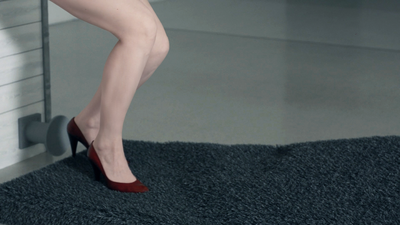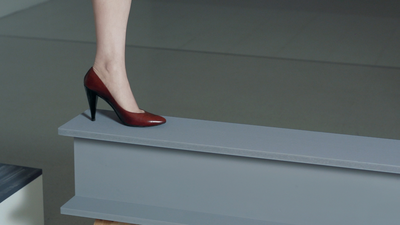ten Bhomer, Marloes [Designer] (2014) Annabelle, Barbra, Becky, Alexis, Krystle, Ellen, Olive, Eve and Kirsten, not stumbling, sliding, sinking falling or oblivious. (design film).
Abstract
Annabelle […] Oblivious is a film output by Marloes ten Bhömer which depicts the researcher training herself to walk fail in high heels across an obstacle course. It is the result of a commission by Transition Gallery for the Folkestone Fringe Festival 2014 and is part of ten Bhömer’s larger design research interest in the relationship between mobility, high heel wearing and the socio-cultural construction of women on screen. The film seeks to contribute gendered approaches to critical design and expand fashion film research through the use of film as both a subject and medium for design research. Ten Bhömer selected and analysed a broad selection of films in order to produce a taxonomy of moments in which a female protagonists’ mobility has been compromised through a high-heel mishap, and where the terrain traversed is complicit in sidelining her. She was interested in how this trope is used as a cinematic tool for plot and character development and to direct the audiences’ perception of the high-heeled woman in question. The woman’s restricted mobility suggests a lack of agency and personality, exposing a relation to her marginalized role in male-centric narratives. Ten Bhömer rejected these normative cinematic representations by designing a film which depicts the researcher training herself to walk without fail across a purpose-built obstacle course, which references selected film landscapes. The set foregrounds these spaces as physical and mental obstacles in the original film narrative while providing a training course for embodied research. By walking over the obstacle course, a means of embodied research, a literal traversing of cinematic of place and history of is achieved. In so doing, ten Bhömer sought to expand feminist approaches to include movement training as a form of protest, seeking to overcome the limitations placed on women’s mobility, subsequent cinematic roles and how they are perceived.
Actions (Repository Editors)
 |
Item Control Page |






![[img]](https://eprints.kingston.ac.uk/47336/26.hassmallThumbnailVersion/ten-Bhomer-M-47336-1.jpg)
![[img]](https://eprints.kingston.ac.uk/47336/27.hassmallThumbnailVersion/ten-Bhomer-M-47336-2.jpg)
![[img]](https://eprints.kingston.ac.uk/47336/28.hassmallThumbnailVersion/ten-Bhomer-M-47336-3.jpg)
![[img]](https://eprints.kingston.ac.uk/47336/29.hassmallThumbnailVersion/ten-Bhomer-M-47336-4.jpg)
![[img]](https://eprints.kingston.ac.uk/47336/30.hassmallThumbnailVersion/ten-Bhomer-M-47336-5.jpg)